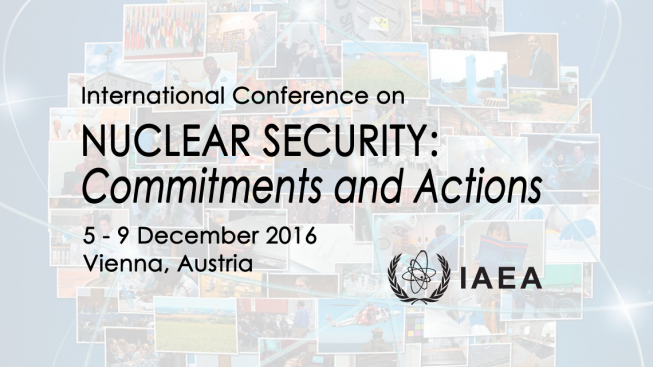Nuclear Security from Cradle to Grave — by IAEA Director of Nuclear Security

The IAEA’s International Conference on Nuclear Security:
Commitments and Actions, will take place in Vienna, Austria, from 5 to 9
December 2016.
On 8 May 2016, the Amendment to the Convention on the
Physical Protection of Nuclear Material (CPPNM) finally entered into
force, almost eleven years after its adoption. The world will be a more
secure place as a result of the commitments that States party to the
Amendment have made.
The Amendment establishes legally binding commitments for countries to protect nuclear facilities as well as nuclear material in domestic use, storage and transport. Under the Amendment, countries are required to establish appropriate physical protection regimes for nuclear material. They also take on new obligations to share information on sabotage, including on credible threats of sabotage.
The entry into force of the Amendment demonstrates the international community’s resolve to act together to strengthen nuclear security globally. It also helps reduce the risk of an attack involving nuclear material, which could have catastrophic consequences.
States have also made other specific commitments to improve nuclear security, for instance through voluntary participation in initiatives such as the Global Initiative to Combat Nuclear Terrorism and by subscribing to the Joint Statement on Strengthening Nuclear Security Implementation issued in 2014.
Through activities under successive Nuclear Security Plans, the IAEA has been assisting States to transform these commitments into actions. The IAEA International Conference on Nuclear Security in December 2016 provides an opportunity for States to take stock of their commitments, as well as of the actions they have taken to fulfil those commitments, and to consider the way forward.
This includes providing advice on the future direction of IAEA support for nuclear security. In implementing the Nuclear Security Plans, the IAEA has positioned itself in a leading role as the global platform for strengthening nuclear security. Such a role builds on our recognized technical capacities, the strength of our membership, which currently totals 168 States, and our inclusive approach, which ensures that the voices of all States are heard in identifying the problems and the solutions to those problems.
Our member states recognize the IAEA’s central role in strengthening the nuclear security framework globally. They have identified areas where additional assistance to improve national nuclear security regimes is required. We stand ready to respond to our Member States’ needs by ensuring that they have the support necessary for cradle-to-grave nuclear security. The IAEA offers an inclusive platform that can help achieve a truly global response to a global concern.
These and other topics will be discussed during the IAEA’s International Conference on Nuclear Security: Commitments and Actions, that will take place at its Headquarters in Vienna, Austria, next week from 5 to 9 December 2016.
The Amendment establishes legally binding commitments for countries to protect nuclear facilities as well as nuclear material in domestic use, storage and transport. Under the Amendment, countries are required to establish appropriate physical protection regimes for nuclear material. They also take on new obligations to share information on sabotage, including on credible threats of sabotage.
The entry into force of the Amendment demonstrates the international community’s resolve to act together to strengthen nuclear security globally. It also helps reduce the risk of an attack involving nuclear material, which could have catastrophic consequences.
States have also made other specific commitments to improve nuclear security, for instance through voluntary participation in initiatives such as the Global Initiative to Combat Nuclear Terrorism and by subscribing to the Joint Statement on Strengthening Nuclear Security Implementation issued in 2014.
Through activities under successive Nuclear Security Plans, the IAEA has been assisting States to transform these commitments into actions. The IAEA International Conference on Nuclear Security in December 2016 provides an opportunity for States to take stock of their commitments, as well as of the actions they have taken to fulfil those commitments, and to consider the way forward.
This includes providing advice on the future direction of IAEA support for nuclear security. In implementing the Nuclear Security Plans, the IAEA has positioned itself in a leading role as the global platform for strengthening nuclear security. Such a role builds on our recognized technical capacities, the strength of our membership, which currently totals 168 States, and our inclusive approach, which ensures that the voices of all States are heard in identifying the problems and the solutions to those problems.
Our member states recognize the IAEA’s central role in strengthening the nuclear security framework globally. They have identified areas where additional assistance to improve national nuclear security regimes is required. We stand ready to respond to our Member States’ needs by ensuring that they have the support necessary for cradle-to-grave nuclear security. The IAEA offers an inclusive platform that can help achieve a truly global response to a global concern.
These and other topics will be discussed during the IAEA’s International Conference on Nuclear Security: Commitments and Actions, that will take place at its Headquarters in Vienna, Austria, next week from 5 to 9 December 2016.

No comments:
Post a Comment